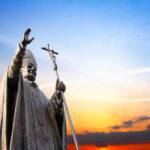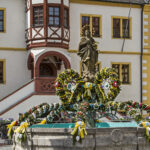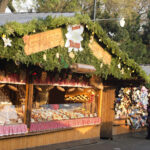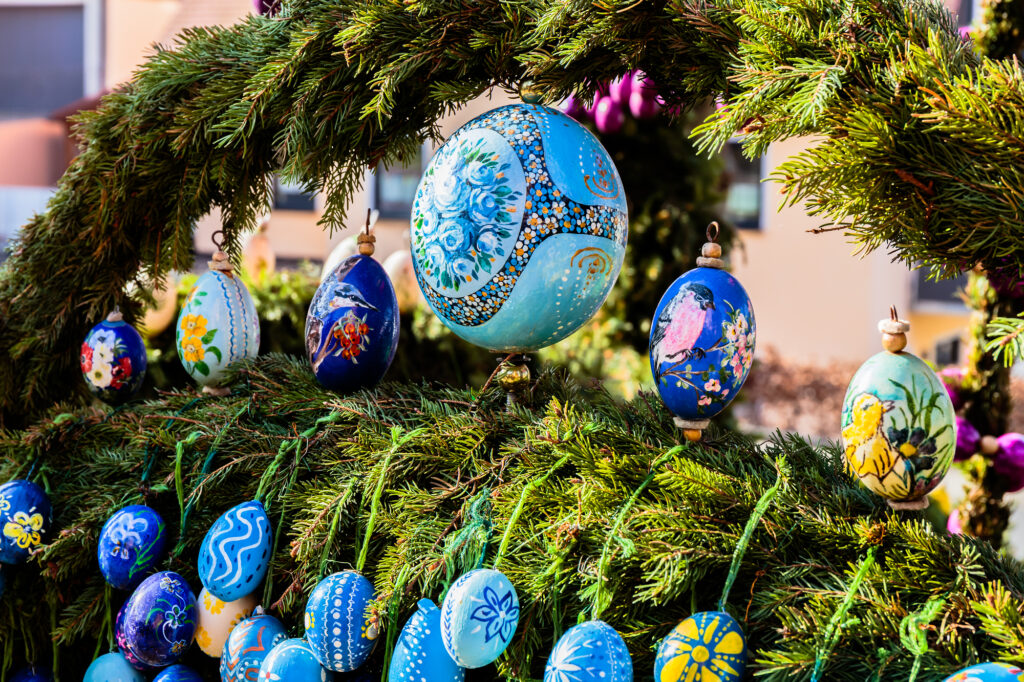Happy Easter! Καλό Πάσχα! Frohe Ostern!
 Did you know that Easter does not fall on the same day around the world? I had heard this, but it wasn’t until we lived in Greece that I learned more about it. At the first Council of Nicaea, in what is now Turkey, Christian leaders met in 325 to iron out their differences and standardize the church. One of the primary debates concerned the setting of a date for Easter, which until this time had been celebrated on several dates.
Did you know that Easter does not fall on the same day around the world? I had heard this, but it wasn’t until we lived in Greece that I learned more about it. At the first Council of Nicaea, in what is now Turkey, Christian leaders met in 325 to iron out their differences and standardize the church. One of the primary debates concerned the setting of a date for Easter, which until this time had been celebrated on several dates.
The primary goal was to keep the observance in line with the timing laid out in the Bible. Therefore, Easter must always come after the Jewish Passover. After all, Jesus attended this feast, so it could not occur after the Crucifixion. As the date for Passover fluctuates each year, the date for the observance of Easter was determined to be the Sunday after the first full moon following the vernal (spring) equinox.
That all sounds pretty complicated, but it became the accepted practice for over 700 years. Then, in 1054, the Great Schism occurred. The Eastern and Western factions disagreed on many things, and the church split into two sides: the Catholic West and the Orthodox Eastern religions. That could be an article on its own, but today, I am wishing everyone a Happy Easter. From 1054 on, the date for the observance of Easter diverged, with the Eastern Orthodox firmly adhering to the Nicaean rule.
When the Catholic church moved to the Gregorian calendar, which aligned better with the solar year, in 1582, the divide widened further. The Orthodox church remained on the Julian calendar. In 1923, at a conference in Constantinople, Istanbul today, the Orthodox church accepted the more accurate Gregorian calendar for all things except calculating the date of Easter. The two holy days last fell on the same day in 2017 and will occur again in 2025.
 As a child, I remember waking up and hunting for the eggs my parents hid for us the night before. Then, my sister and I donned our Easter dresses, and we went to church. Afterward, we ate Easter dinner with our grandparents and enjoyed way too much candy. Little did I know how others marked the holiday until we lived on the island of Crete in Greece.
As a child, I remember waking up and hunting for the eggs my parents hid for us the night before. Then, my sister and I donned our Easter dresses, and we went to church. Afterward, we ate Easter dinner with our grandparents and enjoyed way too much candy. Little did I know how others marked the holiday until we lived on the island of Crete in Greece.
Kathara Deftera, or Clean Monday, kicks off the 40-day Lenten season. Families gather for picnics with traditional foods, such as Lagana, a type of flatbread. They often spend time together flying kites. As we discovered, however, Tsiknopempti, or Smoke Thursday, occurs before this, during Carnivale. Leading into the last weekend before Lent, everyone cooks and enjoys their favorite meat dishes, usually in a cloud of smoke from the grills. If you plan to go out that day, make sure to book a table.
During the days of Lent, Orthodox Christians refrain from meat, poultry, and dairy products. Some areas allow seafood, while others do not. Time is spent in reflection and prayer. Church services occur more frequently, especially leading up to Holy Week. These include communion services on Wednesdays and Fridays and singing hymns of praise. Religious icons are draped in the purple cloth of mourning to be unveiled on Easter morning.
 On Palm Sunday, the week beginning of Holy Week, families make crosses from palm leaves and take them to church. These are blessed by the priest and brought home again. Families attend church services each day of the following week.
On Palm Sunday, the week beginning of Holy Week, families make crosses from palm leaves and take them to church. These are blessed by the priest and brought home again. Families attend church services each day of the following week.
On Good Friday, a cloth embroidered with the image of Christ is carried through the streets in a procession. The local people follow sprinkling rose petals or other available flowers. When they return home, children dye eggs a bright, vivid red, representing the blood of Christ.
Holy Saturday morning is spent visiting their ancestors in the graveyard. At midnight, they gather for the Holy Resurrection Service, the most significant of the year. Following the service, the priest announces Cristos Anesti (Christ is Risen), and the people respond, “Alithos Anesti” (Truly, He is risen). At this proclamation, fireworks explode, and bonfires are lit. People break their fast with the traditional dishes they avoided over the last 40 days.
Resurrection Service, the most significant of the year. Following the service, the priest announces Cristos Anesti (Christ is Risen), and the people respond, “Alithos Anesti” (Truly, He is risen). At this proclamation, fireworks explode, and bonfires are lit. People break their fast with the traditional dishes they avoided over the last 40 days.
To start with, a soup, known as magiritsa, is eaten to prepare the stomach for the meat dishes to come. It is made from the organs of the lambs that will be roasting on the grill later in the day. I tasted it, ensuring I got only broth before the lady opposite offered to finish my portion. I gladly let her have it.
The rest of the day is spent with family, enjoying food and companionship. Dances are often held with local musicians playing. Children and adults, too, play a game called tsougrisma, where two people smack their eggs together, trying to crack each other’s egg. Whoever holds out the longest will have luck throughout the year.
 Later, living in Bavaria, Germany, we participated in the Easter festivities with our landlord’s family. Bavaria is predominantly Catholic in the Western tradition. Following Fasching (Mardis Gras) parades, the Lenten season begins. For the most part, people choose what they wish to give up for Lent each year and spend time in quiet reflection during this period.
Later, living in Bavaria, Germany, we participated in the Easter festivities with our landlord’s family. Bavaria is predominantly Catholic in the Western tradition. Following Fasching (Mardis Gras) parades, the Lenten season begins. For the most part, people choose what they wish to give up for Lent each year and spend time in quiet reflection during this period.
Holy Week begins with Palm Sunday when families bring palm fronds to be blessed by the priest. Thursday is known as Grundonnerstag, or Green Thursday, where people eat green foods, primarily spinach, before attending church services.
Good Friday is a public holiday when all businesses are closed. Processions focusing on the Passion of Christ are held.
While many churches hold Easter Vigils on Saturday, most people spend this day preparing for Easter Sunday by baking special breads sweetened and flavored with spices and dried fruits. One activity common in northern Bavaria is Osterbrunnen, which consists of decorating the wells. Each village has its central well, which is covered in greenery and decorated with eggs.
 Easter Markets are held throughout the season. Though not as large as the Christmas markets, many handmade gifts and local foods can be purchased. As with the Greeks, Easter eggs are decorated, sometimes quite lavishly. It is the Germans who are credited with bringing the practice of dying eggs and holding egg hunts when they immigrated to the American colonies.
Easter Markets are held throughout the season. Though not as large as the Christmas markets, many handmade gifts and local foods can be purchased. As with the Greeks, Easter eggs are decorated, sometimes quite lavishly. It is the Germans who are credited with bringing the practice of dying eggs and holding egg hunts when they immigrated to the American colonies.
And so, whichever day you observe, I wish you all a Happy Easter and hope you have fond memories of celebrations with family. I’d love to hear your stories.

Great article Carol. As always interesting and informative. You never lack in your research.
Thanks! I love doing the research!